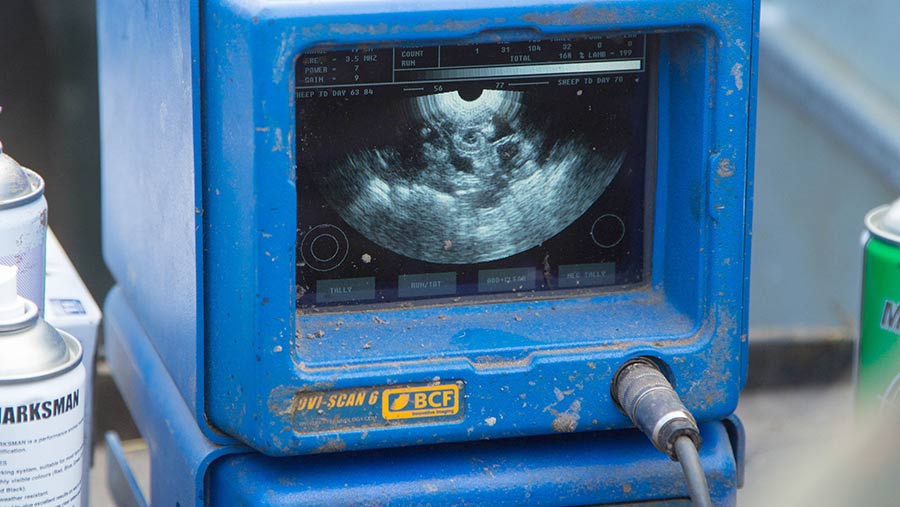Vet Viewpoint: Advice on sheep sub-fertility, tapeworm and TB
 © Tim Scrivener
© Tim Scrivener With anecdotal reports of higher-than-usual barren rates in flocks, vets are stressing that farmers should get pre-breeding checks carried out on rams prior to tupping.
For those that have already mated their ewes, scanning should be carried out to ensure no passengers are carried over winter, with forage already in short supply.
Meanwhile, in Cumbria, tapeworm is causing an increasing number of liver rejections at abattoir, and in Wales, vets are reminding farmers of the importance of carrying out tests to identify BVD-infected animals within herds.
 Liz Nabb
Liz Nabb
Torch Farm Vets, South Molton, Devon
As providers of specialist sheep breeding services, we have been checking semen quality regularly over the summer and it looks like the hot weather has had an undesirable effect on some rams this year.
See also: Clock is ticking for Johne’s veterinary declarations
This sub-fertility will already have had a knock-on effect in early lambing flocks that don’t routinely test their rams before tupping, and I have already heard reports of higher-than-typical barren rates in flocks that have scanned.
As a serious stress event can make a ram infertile for at least six weeks it is important to scan at the earliest convenience. That way barren ewes or sheep that conceived late in the tupping period can be managed separately.
With forage in short supply this year we don’t want “freeloaders” in the flock. If your rams have not yet been introduced this year, think about having a pre-breeding check carried out by your vet.
 Jane Anscombe
Jane Anscombe
Farm First Veterinary Services, Abergavenny, Monmouthshire
Here in Wales we are entering the second year of the Gwaredu BVD project.
All our clients have been offered a herd screen at their annual TB test. Many of the positive results have been in purchased animals.
As the autumn store sales approach, we are reminding farmers that it is easy to test purchased animals for BVD on arrival at the farm.
Some of our clients have started ear notch testing, which can give a result within a couple of hours. BVD tag-and-test is another option, while some farmers still prefer blood tests.
To protect the health of the rest for the herd, purchased animals should be kept in isolation until the results are received. Positive results may indicate transient or persistent infection, so should be discussed with a vet.
 Katie Fitzgerald
Katie Fitzgerald
Lambert Leonard and May, Bakewell, Derbyshire
As vets in an edge area, we are constantly reminded of the challenge the industry faces in controlling bovine TB.
While testing and culling of infected cattle is a critical part of control of the spread of TB, there are many actions farmers can take to reduce the risk of TB entering their herds, including:
- Restricting contact between cattle and badgers
- Managing cattle feed and water sources
- Stopping infected cattle entering the herd
- Reducing risk from contact with neighbouring livestock
- Minimising infection from manure.
The TB Advisory Service offers free advice tailored to your farm to help identify and reduce risks in a range of areas, including wildlife ecology, biosecurity, building design and trading options. The service aims to provide practical advice to help farmers take control of risk of TB entry to their herds.
 Laura Sloan
Laura Sloan
Millcroft Veterinary Group, Cockermouth, Cumbria
An increasing number of our clients are reporting sheep livers being rejected due to Cysticercus tenuicollis (bladder worm).
This is a cyst that infects meat and originates from a dog (or fox) tapeworm.
Dogs eat raw meat infected with cysts, which then develop to mature tapeworms inside the dog.
The sheep digest the eggs laid on the pasture by dogs. Larvae burrow from the sheep’s intestinal wall into the liver causing cysts to develop.
Moderate infestations in lambs can cause a loss of appetite, poor body condition, longer finishing periods, weakness, bleeding and a susceptibility to infections.
Once a sheep is exposed to tapeworm eggs, it is impossible to prevent cysts from developing.
There is no treatment for sheep so the key to prevention is keeping eggs away from pasture.
Ensure all farm dogs receive a product containing Praziquantel at five-week intervals and make sure deadstock is disposed of quickly.
Consider fencing off busy public footpaths to keep other dogs from accessing sheep grazing where practical.
